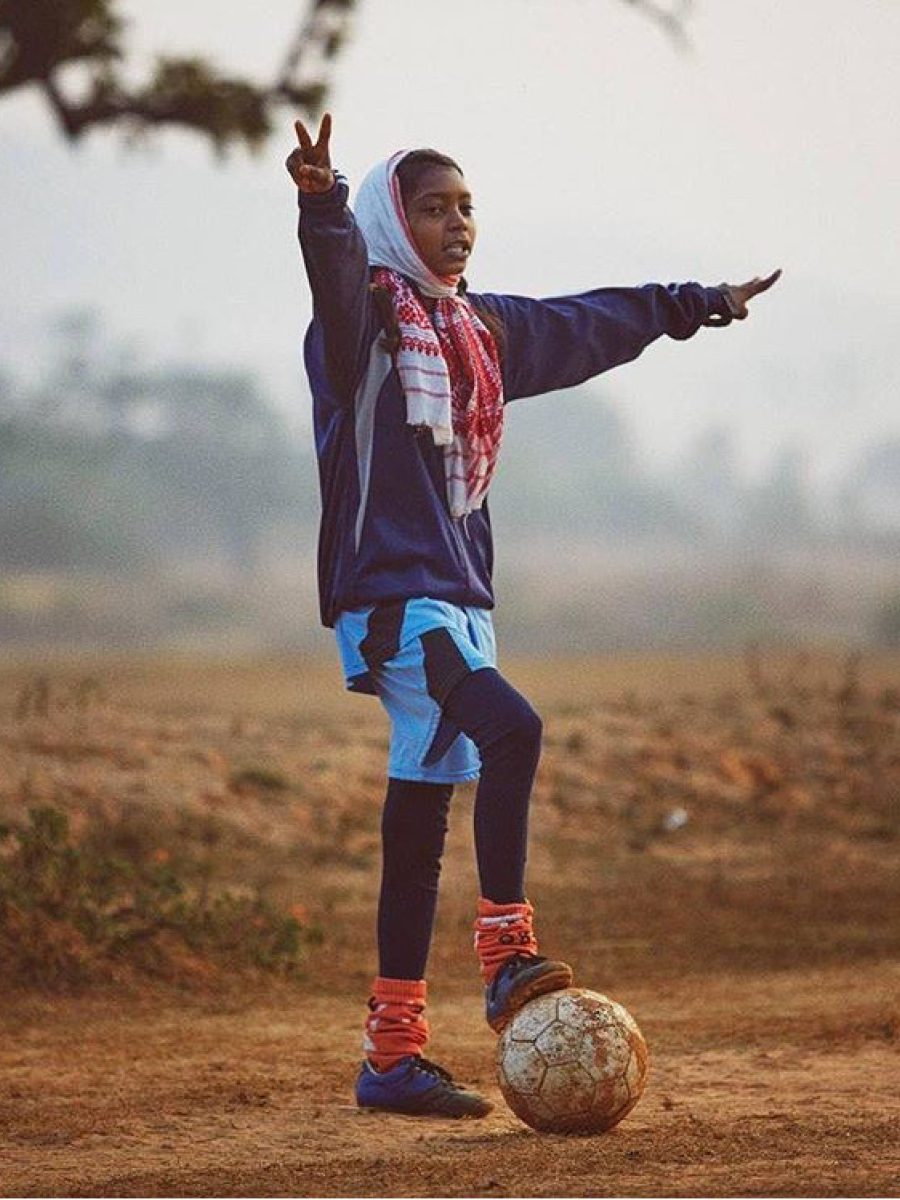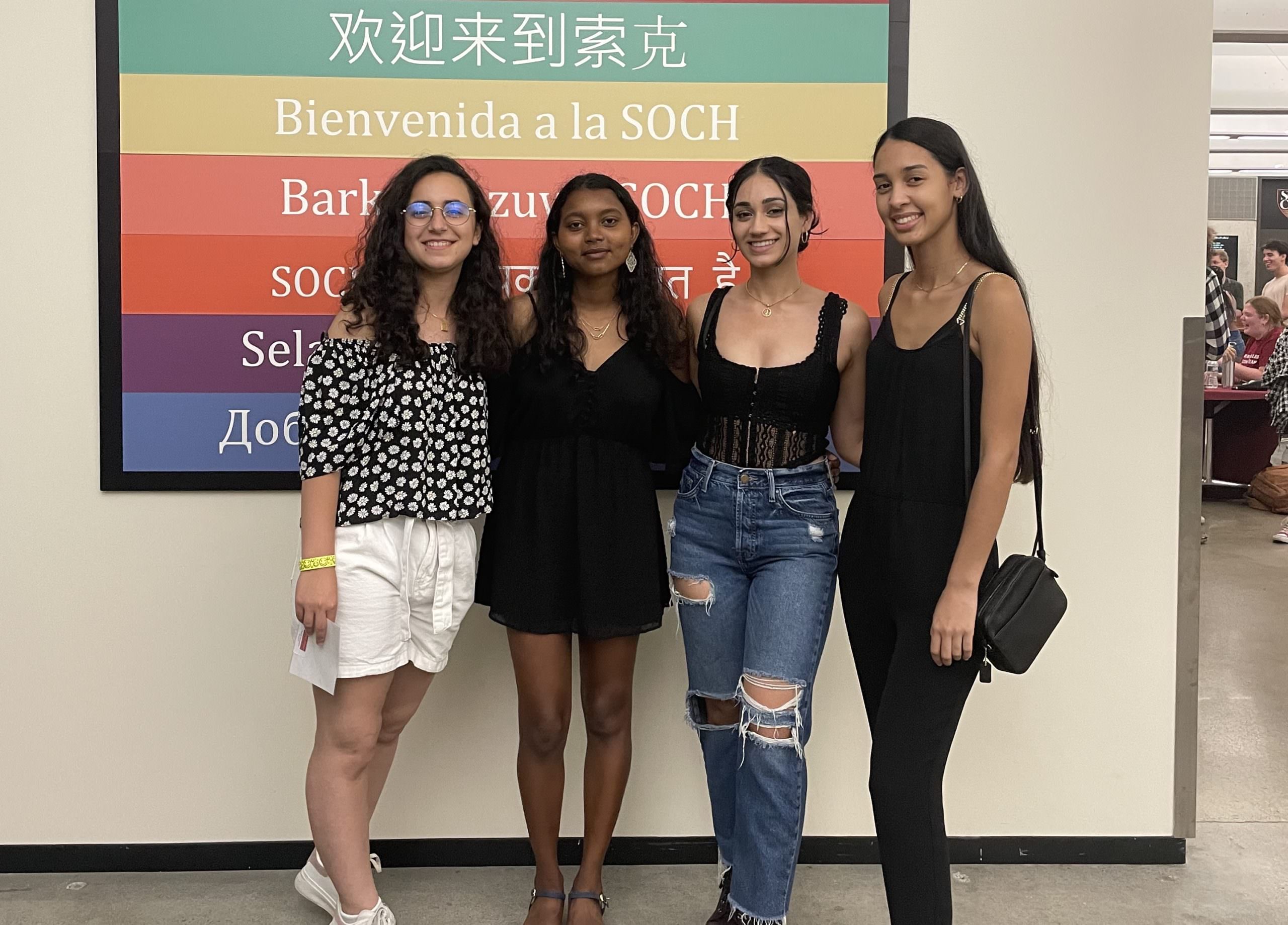When Seema Kumari arrived at Harvard last year, she was a long way from home–and not just physically. Her remote village in the Indian state of Jharkhand, near the border with Bangladesh, has just 1,000 people, most of whom are farmers and many of whom are illiterate. Her own parents had little schooling, but her father made ends meet at a local thread factory and pooled expenses with his brothers, sharing a roof with 19 family members. Seema had few paths open to her beyond domestic life–until, one day, everything changed.
In 2012, a soccer program run by Yuwa showed up in her village and began recruiting local kids. Seema joined the team right away, fitting in practices between her duties of fetching well water and attending the local government-run school. The team began traveling around and competing, even internationally, and Seema, for the first time, could see the world beyond.

Seema Kumari was recruited to the Yuwa soccer program in 2015, a move that would change the course of her life forever..

Seema Kumari ’25 is now a sophomore at Harvard College, majoring in economics.
“There was the pressure of dowry and the cost of weddings in the village; girls are a burden because of having to spend so much money on them. You don’t get to live your education. I felt like I wanted to be independent and take all the opportunities along the way,” recalls Seema, who eventually became a soccer coach to pay her school fees.
At the same time, Yuwa leaders could see the academic promise in young girls like Seema but recognized the constraints of the local public school system. In response, in 2015, Yuwa opened a new school in the village, and Seema went from being in a class of 70 to one of just six students. Teachers from around India’s major cities and the U.S. came to teach there, opening up her world and increasing the rigor of her courses. She started learning English, unbelievably, just five years before applying to Harvard.
“In just a few months, I could see myself learning so much,” says Seema.
In 2015, Yuwa opened a new school in the village, and Seema went from being in a class of 70 to one of just six students.
She also began taking advantage of any opportunity that came her way. She participated in a high-school exchange year in Seattle, a residential summer program at Cambridge University, and another at Washington University.
Life Beyond the Village
In St. Louis at Washington University, Seema saw for the first time what college life looked like and, importantly, could envision herself and all the possibilities it could bring.
“I felt like I could be accepted more outside than in India. When you come from a poor background, they think you are an alien. I felt like I would have a better experience. I wanted to come to the U.S., a place that is such a college destination for students.”
But Harvard was still not on her radar until an American English teacher, Maggie, joined the Yuwa school. Maggie was a Harvard College alum and started at Harvard Law School the following year. It was then Seema’s dream to apply took hold.
Her teachers started helping the promising student with applications, editing essays, and filling out financial aid applications. She had heard there were resources for low-income students, which bolstered her confidence to keep moving forward. But the challenges of getting through the application process were many, including the expenses involved in taking the required standardized tests–an expense of not just the test but travel to a “test city” that would have been unimaginable for a farming family like hers.
New Pandemic Paths
But it was the year of the pandemic, and a new avenue opened up: standardized testing at Harvard became optional, and Seema added the University to her Common Application.
“My admissions officer reached out to my principal, Rose, several times. They were very happy with my application but wanted to verify a few things. They wanted to check my math and English skills as I didn’t take the SAT/ACT, and I had to get the English Proficiency Test waived. They asked for more recommendations.”
With the due diligence done, the moment came that would change the course of her life forever: in a room in her village house in the middle of the night India time, far from the hallowed halls of Harvard, the email came through: accepted.
“I woke up seven times throughout the night,” recalls Seema. “I couldn’t believe it. I called Rose, a few of my teachers, and my host parents during my exchange year,” and announced the news: “‘I’m going to Harvard.’”
When I go back, it motivates me to work harder. My mother has told me that when you have to do something, the action matters more than the words…. There was that belief that if you work hard, it will pay off.
The celebration of Seema’s incredible story rippled throughout the country, even receiving a Tweet of “congrats” from the actress Priyanka Chopra. Although everyone seemed to see the village girl’s rise to Harvard as an extraordinary story of triumph over hardship, back home in her village, Harvard had no context, and the name had no association.
“When I go back, it motivates me to work harder. My mother has told me that when you have to do something, the action matters more than the words. I just tried to use the opportunities available to me–if not through Yuwa, then through other programs, Washington University, and then Cambridge. There was that belief that if you work hard, it will pay off.”
A Thriving Harvard Student
It’s a belief that Seema continues to inculcate as a thriving student at Harvard. Now a sophomore, Seema has found a connection with other first-generation students from across the globe and enjoys the campus’ diversity. Academics, she says, have been intense, but she has persevered, as her mother told her to do. She is a part of the Interfaith Society, Woodbridge International, Harvard Student Agencies, and Food Lab and attends cultural events by the South Asian Association and Harvard Dharma.

Seema, second from left, has joined many student groups on campus and has made friends from South Asia and beyond..
When she graduates with her Harvard degree in hand in 2025, Seema has more ambitious goals on the horizon: she first and foremost wants to become financially independent–to show other girls in her village what that looks like and means. And, one day, she hopes to pay it all forward, to return to Jharkhand to help forge new paths and possibilities for the next generation of young girls who might not ever have imagined how their future may be so bright.
This article was written by Carlin Carr, Communications Manager at the Lakshmi Mittal and Family South Asia Institute.
